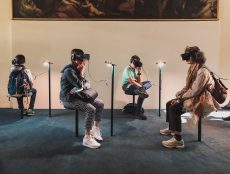
Before the pandemic, many educational experts were wonderintg when and to what extent the online learning model would disrupt higher education. After all, the technology existed. It seemed to some like a matter of time before the economic case would make the incentives to transition overwhelming.
However, that didn’t happen. Many universities continued to deliver education in the same format. While the technology was ready, the correct financial incentives were not. Universities very much seem themselves as operating on an in-person model.
But with the advent of COVID-19, that all changed. It was no longer possible for universities to give classes to packed lecture theaters. They had to either shut down or provide education online.
The COVID-19 Shock
This sudden shift away from the classroom isn’t just a university phenomenon. It is happening all over the world in schools and colleges too. Both educators and students want to avoid infections, and so they are looking to technology to save them.
For eLearning, this is wonderful news. It finally means that mainstream institutions have real incentives to change education delivery. It could potentially spell a change in how they use campuses. And some might decide to scrap them altogether.
In many ways, universities are having to respond to competition in the marketplace. Despite failing to offer any face-to-face education last year, most kept their prices the same. Students, therefore, started looking for other options, wondering if they could get a better deal by skipping traditional education entirely and getting learning online.
Naturally, institutions responded. And now we’re witnessing an online movement where students can access lecture materials both in person and via the web.
Going digital may actually help universities keep better track of students and their progress. Very few institutions keep registers of who turns up to lectures, so online platforms could dramatically change this while reducing admin costs.
The Future Of Learning
How this will affect the future of learning remains to be seen. Top MBA admissions consultants are still seeing excellent business, especially for applicants who want premier schools on their CVs.
The most likely outcome is a hybrid education model. Students will spend some time in formal classrooms and the rest at home on their laptops. Many students will choose to connect to lectures from parks or libraries – wherever they feel they can work the best.
Universities, however, will need help to transition. For some, putting all their courses online was relatively easy because they already had the systems they needed in place. But for others, the technical expertise simply didn’t exist, so it was much harder.
The way lecturers teach is also going to change. Instead of just blasting out information to a big hall, lecturers are more likely to get involved in chat groups and have video meetings with their students to discuss work. Arranging these facilities online is simpler online than trying to do it through traditional “office hours.” Students can get instant access to professors without having to wait for days.
There are challenges, though. Students still require reliable internet access – something that many of them do not have.
Featured Image: Thought Catalog, Unsplash.









One Comment